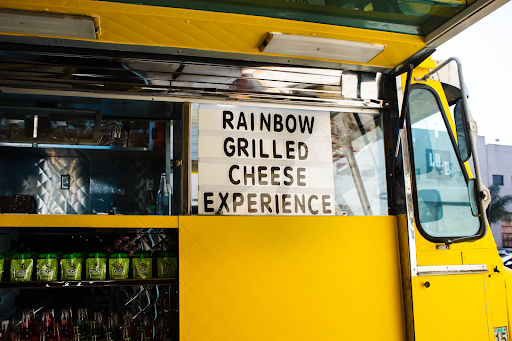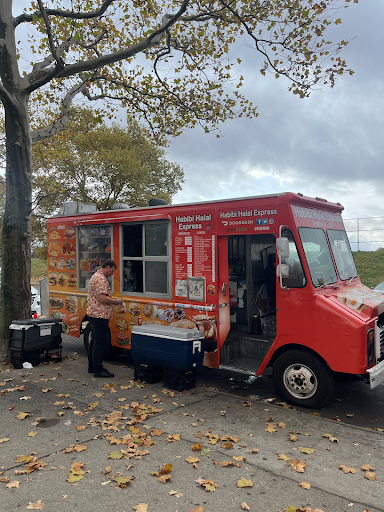Lunchtime at the Bronx High School of Science is a break from classes — and for many of us, a chance to grab something hot and tasty from one of the many food trucks that line the street right outside of the school’s campus. From savory gyros to spicy burritos, food trucks have become part of the Bronx Science school culture. But this year, there was a shift. The once-diverse options now all share the same branding: Habibi Halal Express. This change raises the question: what’s behind this transformation, and what does it mean for the food truck selection near Bronx Science?
Back when I first walked into Bronx Science as a ninth grader, the food truck choices were clear-cut: Jay’s El Gran Campeon, Ned’s white truck, Tony’s halal cart, and Jerome’s truck down the block. Now, as a senior, some of these trucks have merged under the same Habibi Halal Express brand, a move reminiscent of the United States Gilded Age practice of horizontal integration — when one business absorbs its competitors at the same level. So, why do these trucks, once proudly independent, now operate under a unified brand?
For many students, the food truck experience is more than just lunch — it’s a daily ritual that brings variety to the school day. “I come here almost every day, because it’s easy and affordable,” said Quinn Hurley ‘25, a regular at the original Habibi Halal Express location on Jerome Avenue. “My favorite is definitely the chicken over rice. It’s flavorful and filling.” Hurley’s comments reflect a common sentiment among students who appreciate the value and variety food trucks bring, even if some feel the choices are now more limited.
Some students also see the recent brand consolidation as a sign of changing times. “It used to feel like each truck had its own personality,” said Maxwell Miller ‘26. “Now, they all look and taste the same. I don’t mind because the food’s good, but I miss having more options.” This begs an essential question: while the food quality remains, does the uniqueness fade when everything is under one label?
In cities like New York, where real estate prices are soaring and space is constantly limited, food trucks provide a cheaper alternative for both vendors and customers. The city’s strict zoning laws and lack of affordable commercial properties have made it nearly impossible for new restaurants to open in some neighborhoods. However, food trucks can bypass these constraints, offering high-quality food at a fraction of the cost — both for themselves and for their customers. A study found that on average food truck meals cost 50% less than comparable meals at sit-down restaurants.
The life of a food truck operator is far from glamorous. Hours are long, and the logistics can be grueling. Each day starts early, with hours spent preparing ingredients, loading the truck, and navigating city traffic to secure a good spot. Weather can be an unpredictable adversary, as trucks are often at the mercy of rain, snow, or the blistering heat of summer — which ends up decreasing customer activity. Then there are the maintenance challenges — a broken engine can shut down a business for days. In New York, vendors also face fierce competition and heavy regulation, with only about 5,100 mobile food vending permits available, according to a 2023 report from the Department of Consumer and Worker Protection. Yet there are fourfold the number of food vendors on the streets.
The rise of food trucks has not gone unnoticed by investors. With the potential for high margins and low operating costs, more entrepreneurs are turning to this business model as a viable way to break into the food industry. Industry data shows that most food trucks earn between $250,000 and $500,000 annually. Those figures can climb even higher for trucks that operate in higher-traffic areas.

Ned, a figure in the greater Bronx Science community, has been a food truck vendor near the school since 2018. He began independently, drawn to the flexibility and community connections that came with operating a food truck. “I wanted a business where I could serve people directly,” Ned explained. “Running a truck lets me bring great food to people who are on the go.” For him, the food truck industry offered an affordable entry into the food world without the high rent and personalized interactions with students.
“There are challenges you don’t always see,” Ned shares. “If I don’t get my ingredients early, I’m stuck with whatever’s left, and prices keep going up. When it rains, business drops. But I still love it. It’s about meeting people and giving them good food.” Despite the hurdles, Ned’s dedication to his business and customers has helped him build a loyal following.
Ned acknowledges that the food truck scene has become more competitive across the city, as both seasoned vendors and newcomers try to find their place. “When I started, there were fewer trucks, and it felt more personal. But lately, it’s tough to stand out.” That’s one reason why he decided to rebrand under Habibi Halal Express. “Joining Habibi meant I could focus more on cooking and less on worrying about supplies or marketing,” he said. “It’s a partnership that lets us all work together while keeping our trucks running smoothly.”
For students, the shift has generated mixed feelings. “Habibi’s a great brand, and they’ve kept the food quality high,” said Mushfiqur Rahman ‘25. “But I miss the variety we had before. Now, there’s just this one big brand, and it feels more corporate.” This sense of nostalgia is common among older Bronx Science students, who fondly remember the days when each truck had its own unique appeal.
This transformation at Bronx Science mirrors a larger trend in the food truck industry across New York and other major cities. Last year, the food truck industry in the U.S. was valued at approximately $4.3 billion. The number continues to rise, projected to grow by 5% annually between now and 2032. Opening a restaurant in New York City, for instance, can easily cost upwards of half a million dollars between rent, renovations, permits, and staffing. Food trucks, on the other hand, require significantly lower start-up capital. Retrofitting a truck to handle the rigors of a mobile kitchen costs about $50,000 to $100,000, a fraction of the price, but still an investment that demands careful planning and execution. Many trucks, like those under the Habibi Halal Express brand, choose to focus on locations with heavy foot traffic, such as schools, office parks, and event venues, in order to keep business profitable.

The recent consolidation of Bronx Science’s food trucks is a natural evolution of this highly competitive industry. “There’s something exciting about knowing you can just drive to a new spot if business slows down,” said Ned. “But it’s also good to have a brand that people recognize and trust, so they know what they’re getting.” This flexibility and adaptability are part of what makes food trucks so resilient, even in challenging economic times.
While the recent branding changes have sparked conversation, the quality of food has kept students coming back. Adam Dewalle ‘25 shares his thoughts on the new Habibi Halal Express options: “I was skeptical at first, but they’ve kept the food delicious. I can always count on their falafel to be fresh and crispy.” For Dewalle and many others, the food truck experience remains a staple of school life, even if the names and branding have changed.
As for the future, Ned remains optimistic. “I see myself staying here, building a base with the students. Maybe one day I’ll expand the menu or add some seasonal items, but for now, I’m happy to serve Bronx Science,” he said. His hope is that Habibi Halal Express will continue to grow without losing the community spirit that makes each truck feel like a familiar part of the neighborhood.
In a city where change is the only constant, Bronx Science’s food trucks remind us of the importance of adaptability. Even as the names and faces may evolve, the essence remains — affordable, quick, and delicious food served with a smile. So while some may miss the old days of Ned’s white truck or Tony’s independent cart, others are excited about the consistency and close proximity that Habibi Halal Express brings. And who knows? Maybe Jay’s will join the Habibi family next. For now, though, we’ll keep lining up at lunchtime, ready to experience a little taste of New York — one bite at a time.
In a city where change is the only constant, Bronx Science’s food trucks remind us of the importance of adaptability. Even as the names and faces may evolve, the essence remains — affordable, quick, and delicious food served with a smile.

